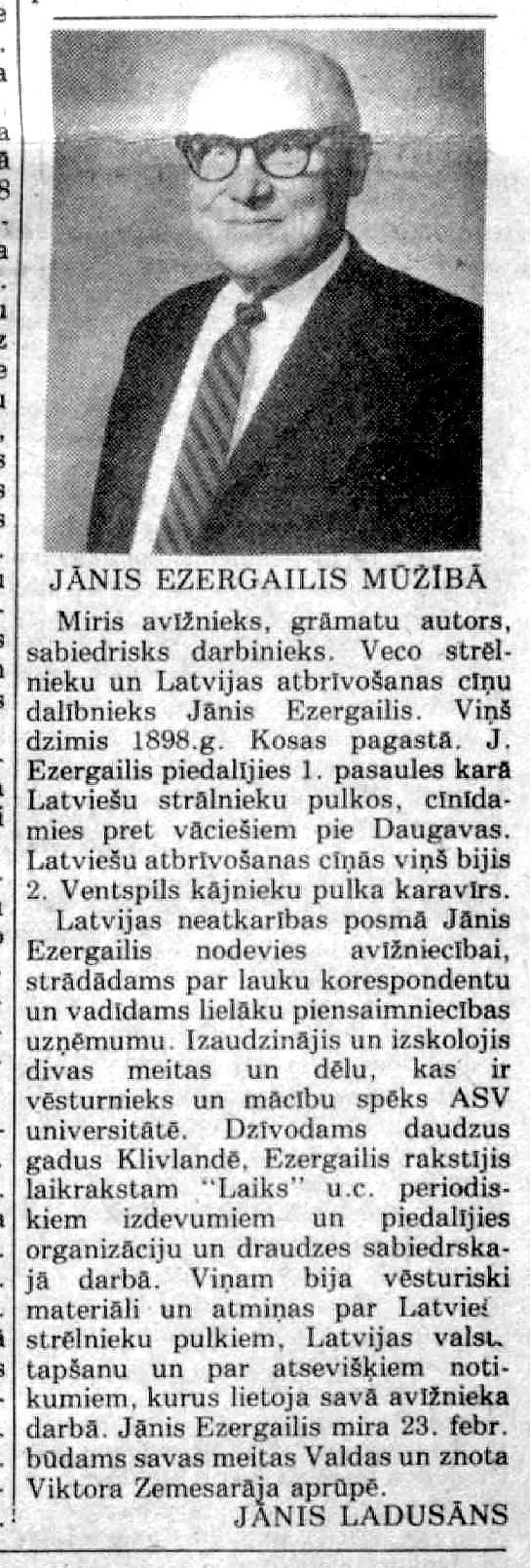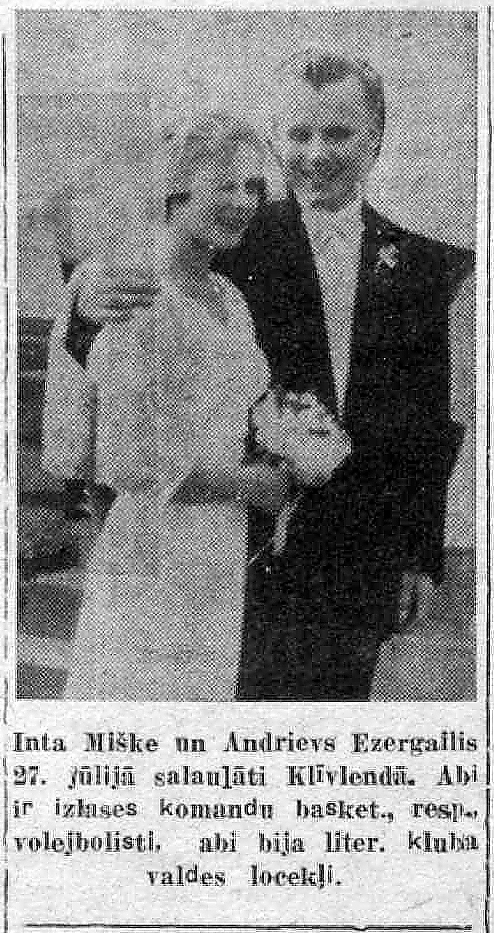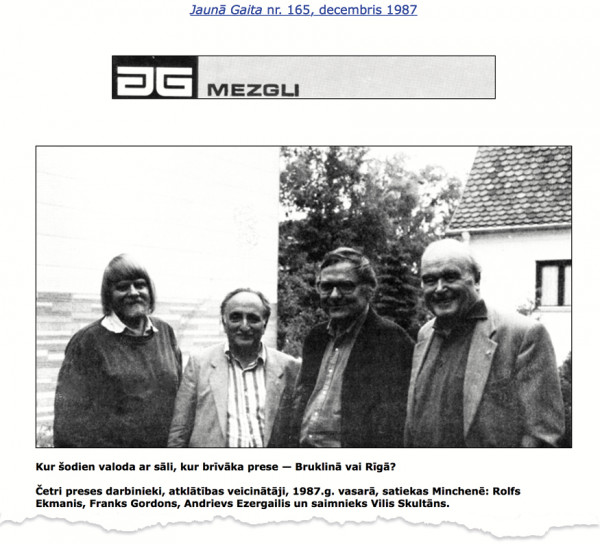The late historian Andrew Ezergailis (1930-2022) defined Latvia's place on the Holocaust map
In the 1980s, Andrew Ezergailis wrote what the highest officials of the still unrestored Republic of Latvia would have to say about the Holocaust. Adapting the words spoken by Ezergailis year after year at the commemorations of the extermination of the Jewish people at the Rumbula Memorial is a duty necessary for the existence of the state.
Fate had given Andrew Ezergailis a long but difficult life. He had to not only research and discover, but also prove to the Latvian community in exile what now sounds as self-evident as 2x2=4.
A.Ezergailis was born in 1930 in the parish of Rites, Jēkabpils County, in the family of dairy managers Jānis and Berta, née Gaile. They raised two daughters and a son who continued the path started by his father. After coming to America, Jānis Ezergailis (1898-1984) found the opportunity to turn to research and journalism, which included a collection of articles on the Latvian writer, clergyman and politician Andrew Niedra (1871-1942), published in 1961. It is therefore understandable how Andrew Ezergailis came by his name. J. Ezergailis's point of contact with A. Niedra was the consistent anti-communism that he acquired in the Red Latvian Riflemen regiment that protected the Russian communist leader Lenin. Seeing this particular man and his companions up close allowed him to understand what the majority of his comrades did not understand and paid for with their lives in 1937-1938. Jānis, on the other hand, took advantage of the confusion of the war to return to Latvia via Ukraine and fight in the ranks of the Latvian army. At least as a signboard, A. Niedra served the army, which sometimes fought alongside the forces of the 18 November Republic, and sometimes against them. As a result, A. Niedra was proclaimed a scapegoat, the mention of whom with a good word was not a common thing among the Latvian exiles.

A.Ezergailis and his wife Inta have compiled his father's written legacy into a book, "Skices un atmiņas" (Sketches and Memories), published in America, which the "United London Newspaper and Latvia" announced on January 16, 1989 under the title "A book in memory of a true Latvian": "Jānis Ezergailis is not the kind of Latvian national worker who is known and familiar to the entire exile family or even to the entire Latvian nation. He was known only to his immediate circle, his contemporaries and, above all, to the editors of various periodicals. He was, as his son writes in the introduction to the book, a man of memories (p. 1). In a great many Latvian publications, both in the then free Latvia and while living abroad, Ezergailis writes memories of times, events and people he has encountered in his long life... In our literature, it is very rare to see children building and creating a monument to their father in the form of a book. I would like to say that this peculiar monument has indeed succeeded."
The impossibility for the family to stay in Latvia deprived them of everything they had saved in material and social terms, but, in the words of A. Ezergailis, it prolonged his childhood by five years. In the refugee camps in Germany, the children were educated, but it took a back seat to dealing with domestic issues and simply spending time in a fun way.

In one of the camp schools, A. Ezergailis found himself in the same class as Inta Miške (1932-2005), whom he later married in the USA. A. Ezergailis had to pay for his prolonged childhood with hard work in the USA, first on a cotton plantation, then on a cow farm, then in a restaurant as a dishwasher and finally in an automobile factory, where the wages allowed Ezergailis to pay for his history studies at university. The need to combine studies with work prolonged his studies. He started his studies in the University of Michigan in 1950 and ended them in 1964. He received his PhD from New York University in 1968. For several years he was able to devote more time to his studies because his living expenses were covered by his wife, who was able to get a better-paid job as a linguist and literary scholar more quickly. Their daughter, Anna, was born in 1971.
In his historical research, A. Ezergailis first focused on Latvian participation in the 1917 revolution in Russia, i.e., on generalizing his father's life. The Americans were not very interested, and the Latvian exiles did not like the fact that such Red Latvians were mentioned at all. Therefore, A. Ezergailis looked for another direction and came across the Holocaust, his study of which was instrumental in the restoration of the Republic of Latvia.
Here you can find the electronic address of the article "Mūsu pagātnes neatbildētie jautājumi" (Unanswered Questions of Our Past) by A. Ezergailis, printed on paper in the September 1987 issue of the magazine "Jaunā Gaita", which is worth keeping in mind in its entirety, quoting here just a few lines: "In 1941/42 about 100,000 Latvian citizens were murdered. These murders cannot be concealed. There's no point in pretending that they did not happen. There has never been a greater flood of blood in Latvian history. On two days alone: on 30 Nov and 8 Dec, 24,000 Latvian passport holders were shot dead in the pine trees of Rumbula. Their spirits are flying around somewhere. They will not be silenced and they will not be at peace until this mass murder has been solved, identified and documented. (..) If we are talking about the restoration of the Latvian state, then these murders cannot be left unsolved. We must give an account for the souls of all the murdered Latvian passport bearers. We will have to. That is the minimum that the world will demand of us if we want to restore Latvia as an independent state. We have to feed the ghosts." The following is a literal cheat sheet, which was read by the most prominent representatives of the Latvian exile before the restoration of the state and which will have to be adhered to in the future: "We, the representatives of the free Latvian people, deplore the extermination of the Latvian Jews and regard it as a great tragedy for our country and nation. The extermination of the Latvian Jews was not in the interests of our people, and it was not carried out by the will of our people. We also acknowledge that several hundred members of our people obeyed Nazi orders and participated as individuals and in units in the murder of Latvian Jews..., we condemn the actions of these Latvian murderers", etc. Just recently, Neatkarīgā confirmed that these were the exact type of phrases paraphrased by the President of Latvia, Egils Levits, and the Speaker of the Saeima, Ināra Mūrniece, at the commemoration of the 80th anniversary of the Rumbula massacre, and that they are no different from the events of every previous year since the Rumbula memorial was erected, and since the restoration of the country's independence, otherwise there would be no country and no memorial here.
As for 1987, it seems to us that we were all wise enough, united enough, or at least enlightened enough, because the restoration of the Republic of Latvia had by then entered the home straight. In reality, nothing happened smoothly and easily. The publication of A. Ezergailis provoked an outburst in the January 16, 1988 issue of the newspaper "Latvija Amerikā" that "a terrible article has appeared in the magazine 'Jaunā Gaita'" because its author "suggests... that our organizations should approach Jewish organizations and repent"; "the figures and accusations made by Ezergailis do not stand up to criticism". Earlier in 1979, in all the most prominent Latvian newspapers of exile, a collective of authors (Lidija Švābe, Agnis Balodis, Uldis Ģērmanis, Jānis Zalcmanis) had published a circular that "Andrew Ezergailis has already organically appropriated some basic guidelines in the philosophy and propaganda of Soviet history. As the only Latvian historian in exile, Ezergailis has mastered and preached the reactionary theory of Russian racism, rejected throughout the civilized world ('Laiks', 1976, no. 90). We believe that such actions by Ezergailis degrade serious historical research, mislead less informed readers and pour water on the Soviet propaganda mill."
Life forced Latvian exile organizations to reorganize themselves so that the ghosts of Nazism disappeared from their facades, but Latvian local historians navigated the new situation more deftly. For example, on November 29, 1988, the newspaper "Cīņa" carried a report from "Latinform" (now LETA) that "the Congress elected a member of the Presidium of the USSR Academy of Sciences academician A. Saharovs as an honorary member of the Latvian Union of Scientists, as well as several foreign scientists of Latvian origin - Canadian professors Vaira Vīķe-Freiberga and Imants Freibergs, American professors Edgars Andersons, Kristaps Kege and Andrew Ezergailis and Swedish professor Velta Rūķe-Draviņa. The Congress was attended by the Vice-Chairman of the Council of Ministers of the Latvian SSR L. Bartkevičs."
In 2006, on behalf of the Republic of Latvia, Ezergailis received the Order of the Three Stars (IV class). In 2012, he was awarded the Grand Medal by the Latvian Academy of Sciences.

A.Ezergailis' last completed work in book form, "Caur velna zobiem" (Through the Devil's Teeth), was discussed by Elita Veidemane in Neatkarīgā on December 1, 2015. "A. Ezergailis writes in a way that makes you want to read more and more. He bravely demolishes the myths that have prevailed in Latvia for decades about the Holocaust. And the rehabilitation of H. Cukurs is particularly gratifying. It is clear that A. Ezergailis has written this chapter with his heart's blood."
A.Ezergailis can by no means be called the author of just one, albeit thick, work, "The Holocaust in Latvia, 1941-1944", which was published in Latvian in 1999, but in English already in 1996. In it, he wrote that "the Holocaust does not want to open itself to analysis. The atrocities of the Holocaust are too great for any explanation." This does not mean that an account of the Holocaust should end with a list of facts in the form of tables of figures or lists of persons and documents. It means that the analysis will take different forms depending on the objectives of the analysis, the situation and the possible methods.
Neatkarīgā expresses its condolences to the family, friends and colleagues of Andrew Ezergailis. We wish the best of luck to all those who will undertake to continue his work.
